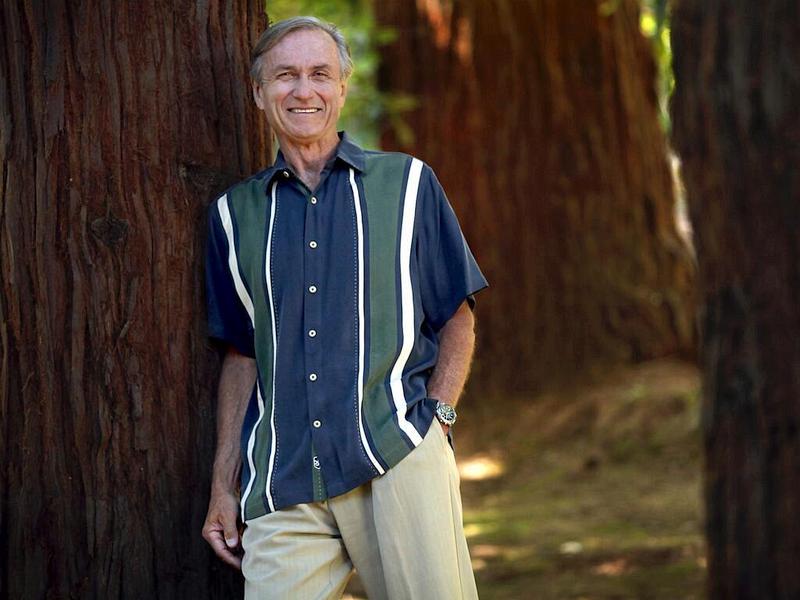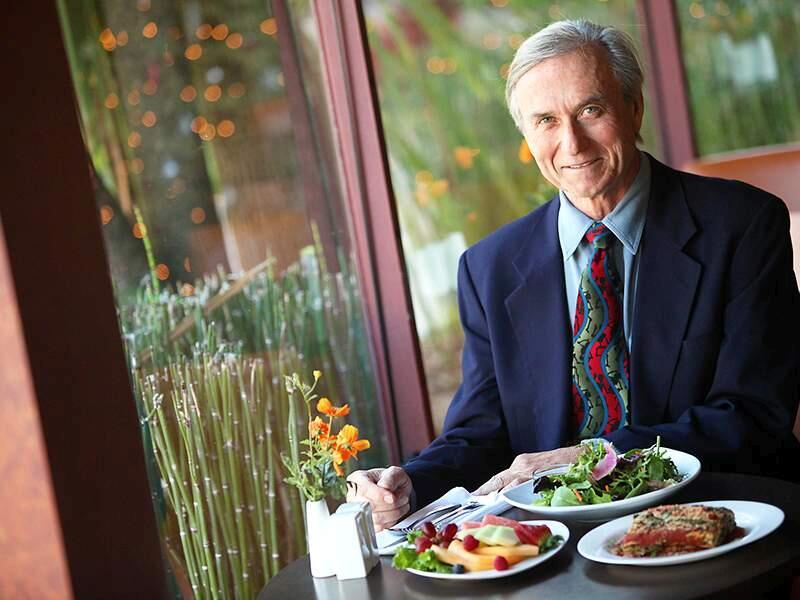John McDougall, who wrote 13 books advocating a vegan diet heavy on starch as a way to weight loss and health, died last month at age 77.
It was a radical notion when Dr. John McDougall began promoting an ultra low-fat, starch-based vegan diet in the early 1980s, a time when even vegetarianism was considered on the fringe.
And yet, his first book, “The McDougall Plan,” cowritten with his wife and partner Mary McDougall, struck a chord among a public looking for ways to lose weight and regain health.
It became a New York Times paperback bestseller in 1985, and McDougall became a household name, turning out 12 more nationally best selling books, appearing on TV and radio talk shows, treating thousands of patients through his McDougall Program. In the process he became a leading advocate for a diet he maintained would “halt, reverse and heal” chronic illness like heart disease and type 2 diabetes.
McDougall died June 22 in his sleep at his Santa Rosa home. He was 77. He was not suffering any known ailments at the time, said his daughter Heather McDougall, who is now CEO of The McDougall Program, which her parents established in the late 1980s at St. Helena Hospital. The program later moved to Santa Rosa and is now maintained online.
“John lived a life full of adventure, love and happiness. Our family will remember him as the man who taught us to live life to the fullest and always speak the truth. The world will remember him as the man who revolutionized modern health care and championed dietary therapy,” Heather McDougall wrote on the Dr. McDougall Health & Medical Center website.
Accolades, condolences and testimonials about how McDougall’s plan transformed lives have poured in through social media. Posters on Reddit variously called him “passionate,” “inspirational” and “ahead of his time.” One said he was “like the Michael Jordan of medicine in terms of effectiveness, he was out there solving the causes of things permanently meanwhile 99.9% of his colleagues are still putting on Band-Aids and treating symptoms.”
McDougall was among a small group of maverick physicians like the late Nathan Pritikin, Dr. Neal Barnard and Dr. Dean Ornish of the Sausalito-based Preventive Medicine Research Institute, who advocated for and helped popularize the idea of treating heart disease and other chronic ailments through a low-fat vegan diet.
McDougall’s signature was a whole foods diet heavy on starches like potatoes, rice and sweet potatoes, along with vegetables and no processed oils or alcohol.
The diet at one point was so popular that more than 100 North Bay restaurants offered McDougall entrees. For years McDougall based his program out of the Flamingo Resort in Santa Rosa, drawing some 2,000 people a year to lose weight and learn a new way of eating that centered on a diet of 90% starchy plant foods, including whole grains, and 10% vegetables and fruit. It is now fully online. His wife, Mary McDougall, a nurse whom he met at the College of Human Medicine at Michigan State University, created a multitude of McDougall recipes for home cooks.
“He was a giant in what he was doing. He was one of the guys in the front lines interacting with patients and in this food-as-medicine world. And the style in which he did it was so amazing,” said Brian Wendel, founder and former CEO of Forks Over Knives, which also promotes a plant-based diet. In 2011 the organization released an eponymous Netflix documentary in which McDougall was featured prominently.
Wendel said McDougall presented his plan in a way that was accessible without getting too deep into the complexities of nutrition and body chemistry. “He made it very simple for people to understand. Hey a starch at the center of the plate and surrounded by vegetables and get on with your life,” Wendel said. Mary McDougall was an important partner, writing some 4,000 recipes to complement the program.
In the 1990s, McDougall sounded off on a daily radio show in Santa Rosa, where his stridency at times chafed against the medical establishment. He publicly condemned the low-carbohydrate, high protein and fat diets popularized by Dr. Robert Atkins that came back in vogue in the late 1990s. In 2000 he participated in “The Great Nutrition Debate” a dueling diets forum sponsored by the United States Department of Agriculture that brought together McDougall, Atkins, Ornish and other big names in a heated forum.
“When I started, I was a little more edgy. I would talk about how heart surgeons were killing people,” McDougall said in a 2012 Press Democrat interview, around the time he published his cookbook “The Starch Solution” (Rodale Press) filled with 100 of Mary’s recipes. “I’ve mellowed. … I’m more diplomatic now.”
Heather McDougall said her father’s passion was fueled by a “desire to tell the truth,” a value he said was instilled in him by his parents when he was growing up in his native Detroit, Mich.
“He wanted to teach the word and get people to eat better and protect the environment. His number one pleasure in life was helping others — and his family,” she said.

He had his skeptics and critics, particularly early on, some of whom dismissed his diet as extreme or not sustainable. More recent research nonetheless, seems to support the health benefits of a plant-based diet. A study released in May by the University of California at San Francisco found that men with prostate cancer could significantly reduce the chances of the disease worsening by eating more fruits, vegetables and nuts and olive oil and only small amounts of meat, dairy and fish.
A stroke of fortune
McDougall suffered a massive stroke at age 18 that left him temporarily paralyzed on the left side and would, he said in an autobiography on his website, leave him weakened for the remainder of his life. He walked with a limp.
Still, he regarded that incident as “one of the great fortunes of my life,“ inspiring him to go to medical school where he met Mary, a surgical nurse, in an operating room in 1971.
“She was his scrub nurse. He just fell in love. He tried to get her to go on a date with him. Finally she said yes and three months later they were married,” Heather McDougall said.
In 1972 the newlyweds moved to Hawaii, where they started a family and the young doctor did his residency. He also served as a general practitioner at the Hamakua Sugar Company. It was there he discovered his life’s work.
“My plantation patients taught me how to eat,” told The Press Democrat in 2012. “The first-generation Japanese, Filipino and Chinese kept their same diet. They were trim and they never had heart disease, arthritis or diabetes.”
The second generation was a different story.
“Their kids raised in Hawaii were eating richer food,” he said. “The kids had gotten a little fatter and sicker.”
“Before my own eyes I saw fully functioning elders thriving on grains and fruits and vegetables. With the inclusion of the two other basic food groups — meat and dairy — the progeny failed,” he would write.
After becoming a board-certified internist in 1978, McDougall started his own dietary-medicine practice in Hawaii. He began speaking out, pressing for the removal of talc from processed rice in Hawaii, California and Puerto Rico, and leading a successful fight to require surgeons to inform women with breast cancer about options other than surgery.
In 1986 he was recruited to run The McDougall program at The Adventist Health hospital in St. Helena, a leading heart surgery center, and moved his family to Santa Rosa. By 1999 he was also offering his program remotely out of hotels in Minnesota for Blue Cross Blue Shield and for a supermarket company in Florida. In 2002 McDougall went independent with his own permanent location out of The Flamingo Resort, where people would come for 10 days to learn “a new way of living,” said Jill Nussinow a Gualala dietitian, culinary educator and cookbook writer who worked with McDougall for many years.
“He got many thousands and thousands of people to look at what they were doing and make huge changes for their health and overall benefit,” she said.
The McDougalls lost their home in the 2017 Tubbs Fire. That same year McDougall retired from running the program, but remained active as a speaker and on his YouTube channel.
“He redefined the way I view medicine,” said Dr. Anthony Lim, who took over as clinical director of the program when McDougall retired. What he learned in medical school and residency, he said, was managing diseases and conditions with medication. But McDougall’s legacy, he said, was showing people that they cannot only manage symptoms but regain their health through what they eat.
When he wasn’t advocating health through diet, McDougall enjoyed windsurfing, traveling, fly fishing and spending time with his family.
“We spent our lives sailing when we lived in Hawaii,” daughter Heather said. “He loved adventure. He was a pilot.”
Heather McDougall said it wasn’t clear what caused her father’s death. “He did have damaged arteries from his stroke. The ideal death is to just go in your sleep. It happened just the way he wanted it to. Sooner than we wanted but the way he wanted to go. I find comfort in that.”
In addition to his wife Mary and daughter Heather, he is survived by sons Craig McDougall of Lake Oswego, Ore., and Patrick McDougall of Orinda; a brother William McDougall of Brookings, Ore.; sisters Linda Dupuy of Michigan and Kay McDougall of Ecuador, and seven grandchildren. Services will be private.

